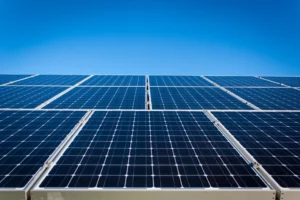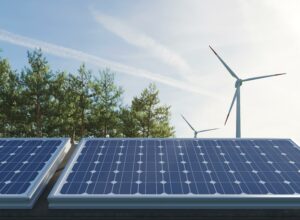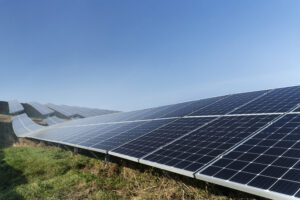Solar panel investments are not only an environmental commitment but also a big financial decision. Having guided numerous businesses and commercial projects through solar panel investments, I can tell you that one of the most critical steps in determining whether solar energy is right for you is to calculate the return on investment, or ROI.
Knowing some of the cost-saving financial benefits is great, especially if your business goal is to save money, go green, or maybe both.
Why Should You Calculate Your Solar Return on Investment?
Solar panels can save businesses and commercial projects money, provide energy independence, and sometimes even add value to a property; we want to make sure you understand the bottom line.
Step 1: Understand the initial investment
Your initial investment is the starting point for ROI calculations. It includes:
- System Cost: This is the upfront cost of purchasing and installing your solar panel system. Make sure you include all components, such as panels, inverters, and others.
- Incentives: Governments and local authorities provide incentives in the form of tax credits, rebates, or grants while installing solar equipment. Subtract all these from your total cost, and you’ll find your net investment.
Take, for example, your solar system costing you ₹2,00,000, and there is an incentive of ₹50,000 for you. That would mean you’d be putting in a net amount of ₹1,50,000 at the beginning for the initial investment.
Step 2: Determine Ongoing Costs
While the maintenance for solar systems is quite minimal, they aren’t entirely cost-free. Add to your math here:
- Maintenance cost: You must pay for panel cleaning expenses, sporadic repairs, and inverter replacements.
- Insurance: If you opt for solar system insurance, add in the premiums.
- Monitoring Fees: Some systems charge a small fee for monitoring performance.
While these fees are typically small, you should add them for accuracy.
Step 3: Projected Savings
The primary reason for installing solar panels is to save on electricity. Calculate your savings based on the following factors:
- Electricity Savings: Calculate your annual savings on your energy bills based on your system’s energy production.
- Increased Property Value: Commercial buildings with solar panels tend to sell for a higher price. You can estimate the increase based on local property trends.
A well-installed solar system can save a lot of money, especially in areas where electricity is expensive.
Step 4: Determine the Payback Period
The payback period is the amount of time it takes for your savings to add up to equal your initial cost. It is the easiest way to decide if solar panels are worth considering. Ideally, your solar investment should pay for itself within four years.
Here are the steps to calculate your payback period:
- Add up your annual savings (electricity savings and any income from selling excess energy).
- Divide your initial investment by this amount.
For example, if your annual savings are ₹37,500 and your initial investment is ₹1,50,000, your payback period would be 4 years. After this point, every rupee saved is pure profit!
Step 5: Calculate the ROI
The ROI gives businesses a clear picture of the financial benefits over the system’s lifetime.
Here is a formula for calculating it:
- Net savings = Total benefit – (Total cost / down payment operating cost of a system over the period of its useful life)
- ROI = (net saving/investment in the program) × 100.
Eg: If your system lasts 25 years and saves you ₹7,00,000 in total while costing ₹2,50,000 over its lifetime, your ROI would be:
ROI = (((₹7,00,000 – ₹2,50,000) ÷ ₹2,50,000) × 100 = 180%
Determinants of Solar Return on Investment (ROI)
Despite the simplicity of the steps, several factors can significantly alter your business’s return on investment.
- Sunlight Exposure: Commercial buildings in areas that get ample sunlight will produce more.
- Electricity Rates: High rates mean a higher savings rate.
- System Size and Efficiency: Large, efficient systems produce more electricity, saving more.
- Net Metering Policies: Businesses can benefit from net metering, which lets them earn credits for excess solar energy sent to the grid. These credits help reduce future electricity bills, but availability and terms depend on the region and utility company.
- Degradation Rate: Solar panels degrade in performance over time; however, most retain a significant amount of energy for decades.
Is Solar Always a Good Investment?
Not every property is suitable for solar power. If your roof does not receive enough sunlight, or your local electricity rates are very low, the benefits will be somewhat limited. For this reason, it is important to assess the property and its energy usage before investing.
Solar installers can give the right estimate for your business or commercial project. If the financial benefits still do not convince you, seek advice from professionals who can assess your energy requirements and potential savings.
Why Choose GSL Energy Solutions?
We take pride in being Kerala’s number one solar company at GSL Energy Solutions. Our services cover a wide array of solar energy services, which include residential and commercial projects. From on-grid, off-grid, and hybrid systems to solar water heaters, pumps, and ACs, we provide end-to-end solutions tailored to your unique energy needs.
Choose GSL Energy Solutions for efficient solar installation Kerala services. We conduct every repair, replacement, or installation with meticulous care, preserving equipment warranties and delivering the best outcomes. With advanced technology and continuous monitoring, we provide real-time support to ensure your solar systems perform at their peak, offering uninterrupted power and maximum savings.
If you think solar energy is a wise investment for your business and commercial projects, then you have come to the right place with GSL Energy Solutions. Our experience makes it smooth and worthwhile to get into sustainability and saving.






